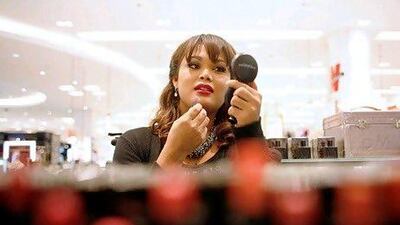There's nothing like a financial crisis to bring out the "lipstick effect" in women, a phenomenon that has been kicking around, apparently, since the Great Depression.
According to Reuters, tough economic times are boosting the sales of beauty products and designer jeans as women focus on looking good and attracting a partner.
Researchers at Texas Christian University in Fort Worth, in the United States, have found that a downturn in the economy has a positive effect on the beauty industry, in what has been dubbed the "lipstick effect", and that price is not an issue, Reuters said.
"Although both men and women downsize consumer spending in response to recession cues, there is an exception to this, and this is beauty products," Sarah Hill, an assistant professor of social psychology at the university, told Reuters.
"Women have an increased desire to purchase these products in response to recession cues. Even though they are closing their purse string for other things, they are wanting to splurge on things that can make them attractive," she added.
A downturn in the economy has been linked to an upswing in beauty sales since the Great Depression, according to Ms Hill, whose research is published in the Journal of Personality and Social Psychology.
Figures from NPD Group, a market research company, support her findings. NPD's numbers show that skincare, make-up and fragrance sales increased 11 per cent in the US last year compared with 2010.
China, Mexico and Argentina also had double-digit rises in beauty-product sales last year, while sales increased 9 per cent in Britain and 3 per cent in France, Reuters reported.
In a series of experiments, Ms Hill and her team examined how and why economic recessions influence women's consumer behaviour. They used real-world spending data and asked consumers whether they would buy a series of products after giving them recession cues.
They found that men did not want to buy anything (typical), while women also showed no interest in products that did not enhance their attractiveness.
"But we did find that there is this robust lipstick effect," Ms Hill said.
---
Floor-to-ceiling windows, chairs by the French designer Philippe Starck, four-poster beds and a short walk from the Louis Vuitton store on London's Bond Street.
These are no ordinary student digs.
Apartments for rent in London's most exclusive neighbourhoods have traditionally been the preserve of bankers, reports Reuters. But as the potency of the financial sector wanes, such accommodations are increasingly let to children of the international super-rich studying at the city's universities.
"I chose the place and then asked my parents whether it was all right," said Sumiro, a 21-year-old Indonesian student who will be living alone in the £895-a-week (Dh5,097) two-bedroom apartment with the Starck chairs when he starts university in September.
Unlike the stereotypical British students who squeeze into cramped flats and shop in budget stores, the offspring of the super-rich exhibit a taste for luxury furnishings, in-house gyms and cleaners who visit twice a week.
"They're looking for a hotel room," Naomi Heaton, the chief executive of London Central Portfolio, told Reuters.
"Many of them would have experienced a fairly sophisticated lifestyle, travelling around the world business class. Their requirements are similar to that of corporate tenants."
According to Knight Frank, prices for the most sought-after central London properties have risen about 44 per cent in the past three years, more than twice the increase across the capital as a whole.
But the biggest surprise?
"The wealth underpinning the student market is stronger than the wealth underpinning the corporate tenant market," Ms Heaton said.


